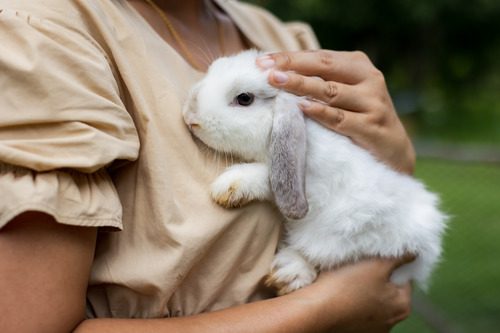Why Is My Rabbit Shaking?
Seeing your rabbit shaking can be alarming and leave you with many questions. Understanding the reasons behind this behavior is essential to ensure your rabbit’s well-being. In this article, we will explore various causes of rabbit shaking, helping you determine the best course of action. If you notice your rabbit shaking and you’re unsure of the cause, contact Paws and Claws Animal Medical Center in Dunedin, FL, at (727) 953-6588 for professional advice and care.

Common Reasons for Rabbit Shaking
Rabbits can shake for various reasons, ranging from environmental factors to health issues. Identifying the cause is crucial for providing appropriate care.
Fear or Stress
Rabbits are naturally skittish animals, and they can easily become frightened. Loud noises, sudden movements, or unfamiliar environments can trigger fear and stress, leading to shaking. When a rabbit feels threatened, its body may respond with trembling as part of the fight-or-flight response. Avoid loud noises and sudden movements around your rabbit, and provide hiding spots where they can retreat if they feel scared. If you suspect stress is causing your rabbit to shake, observe their behavior and try to identify any specific triggers.
Cold or Chilly Environment
Rabbits are sensitive to temperature changes and can easily become cold. If your rabbit is shaking, it might be due to a chilly environment. Ensure that your rabbit’s living area is warm and draft-free, especially during colder months. Provide your rabbit with soft bedding and a cozy enclosure to keep them warm. If you notice persistent shaking despite a warm environment, consult a veterinarian to rule out any underlying health issues.
Health-Related Causes of Rabbit Shaking
In some cases, shaking can be a sign of a health problem. Understanding these potential health issues can help you take the necessary steps to address them.
Pain or Discomfort
Rabbits may shake if they are in pain or discomfort. This can be due to various reasons such as dental problems, injuries, or internal issues. If your rabbit is shaking and showing other signs of pain, such as reluctance to move, loss of appetite, or changes in behavior, it is important to seek veterinary care immediately. Your veterinarian can perform a thorough examination to identify the source of pain and recommend appropriate treatment. Ignoring these signs can lead to further complications and affect your rabbit’s overall health.
Neurological Issues
Neurological problems can also cause shaking in rabbits. Conditions such as head tilt (torticollis), seizures, or infections like E. cuniculi can affect a rabbit’s nervous system, leading to tremors or shaking. If you notice any signs of neurological issues, such as head tilt, loss of balance, or seizures, contact your veterinarian promptly. Early diagnosis and treatment are crucial for managing these conditions and improving your rabbit’s quality of life.
Environmental Factors Influencing Rabbit Shaking
Apart from fear and temperature, other environmental factors can contribute to shaking in rabbits. Being aware of these can help you create a more comfortable living space for your pet.
Noise and Vibration
Rabbits have sensitive hearing and can be disturbed by loud noises and vibrations. Construction work, household appliances, or even loud music can cause stress and shaking. Minimizing noise and vibration around your rabbit’s living area can help reduce their stress levels. Consider placing your rabbit’s enclosure in a quiet part of your home, away from high-traffic areas and loud activities. Providing a calm and stable environment is essential for their well-being.
Lighting Conditions
Bright lights or sudden changes in lighting can also stress rabbits and cause shaking. Rabbits prefer dim lighting and may feel more comfortable in an environment with soft, indirect light. Ensure your rabbit’s enclosure has appropriate lighting that mimics their natural habitat. Avoid exposing them to bright lights or sudden changes that can startle them and cause stress-induced shaking.
When to Seek Veterinary Help
Understanding when to seek professional help is vital for your rabbit’s health. While some causes of shaking can be managed at home, others require veterinary attention.
Persistent Shaking
If your rabbit’s shaking persists despite addressing environmental factors, it is time to consult a veterinarian. Persistent shaking can indicate an underlying health issue that needs to be diagnosed and treated.
Accompanying Symptoms
Look for other symptoms accompanying the shaking, such as lethargy, loss of appetite, changes in behavior, or physical abnormalities. These can provide important clues about the cause of the shaking and help your veterinarian make an accurate diagnosis.
Preventing Rabbit Shaking
Taking preventive measures can help reduce the likelihood of your rabbit experiencing shaking episodes. Here are some tips to keep your rabbit happy and healthy:
- Schedule routine veterinary check-ups.
- Discuss any changes in behavior, diet, or environment with your vet.
- Early detection of health issues through regular examinations.
- Ensure a quiet, warm, and stress-free living area.
- Maintain a consistent routine for feeding, playtime, and rest.
- Provide fresh hay, leafy greens, and limited pellets.
- Ensure constant access to fresh water.
- Introduce new foods gradually to avoid digestive issues.
- Offer ample space for hopping, running, and exploring.
- Use toys and interactive play for mental stimulation.
- Promote a healthy cardiovascular system and prevent obesity.
- Minimize loud noises, sudden movements, and unfamiliar animals.
- Introduce environmental changes gradually to reduce stress.
Providing a Calm and Healthy Lifestyle for Your Rabbit
Understanding why your rabbit is shaking is crucial for providing the best care possible. By identifying the causes, whether they are environmental or health-related, you can take appropriate steps to ensure your rabbit’s well-being. If you have any concerns about your rabbit’s behavior, contact Paws and Claws Animal Medical Center in Dunedin, FL, at (727) 953-6588 for expert advice and assistance. Taking proactive measures and seeking veterinary care when necessary can help ensure your rabbit lives a happy, healthy, and comfortable life.
